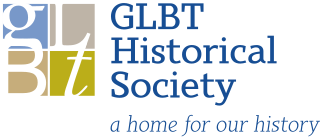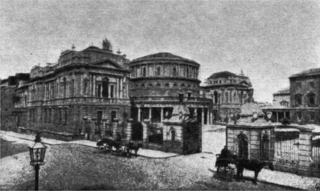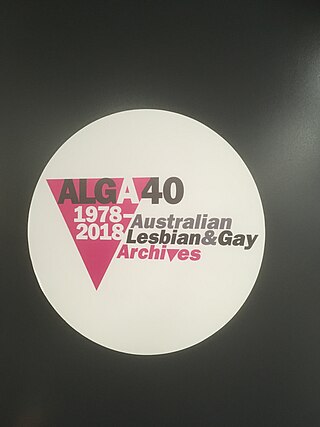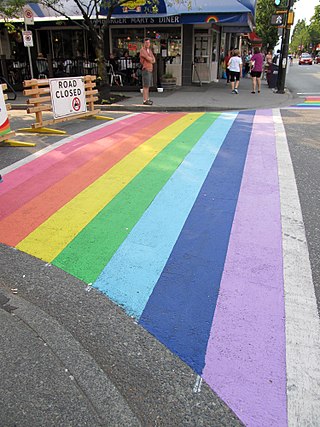Related Research Articles
Queer studies, sexual diversity studies, or LGBT studies is the study of topics relating to sexual orientation and gender identity usually focusing on lesbian, gay, bisexual, transgender, gender dysphoric, asexual, queer, questioning, and intersex people and cultures.
"New queer cinema" is a term first coined by the academic B. Ruby Rich in Sight & Sound magazine in 1992 to define and describe a movement in queer-themed independent filmmaking in the early 1990s.

The ArQuives: Canada's LGBTQ2+ Archives, formerly known as the Canadian Lesbian and Gay Archives, is a Canadian non-profit organization, founded in 1973 as the Canadian Gay Liberation Movement Archives. The ArQuives acquires, preserves, and provides public access to material and information by and about lesbian, gay, bisexual, transgender, queer, and two-spirit communities primarily in Canada.
Martin Bauml Duberman is an American historian, biographer, playwright, and gay rights activist. Duberman is Professor of History Emeritus at Lehman College in the Bronx, New York City.

The Hall–Carpenter Archives (HCA), founded in 1982, are the largest source for the study of gay activism in Britain, following the publication of the Wolfenden Report in 1957. The archives are named after the authors Marguerite Radclyffe Hall (1880–1943) and Edward Carpenter (1844–1929). They are housed at the London School of Economics, at Bishopsgate Library –, and in the British Library.

The Leslie-Lohman Museum of Art (LLMA), formerly the Leslie-Lohman Museum of Gay and Lesbian Art, is a visual art museum in SoHo, Lower Manhattan, New York City. It mainly collects, preserves and exhibits visual arts created by LGBTQ artists or art about LGBTQ+ themes, issues, and people. The museum, operated by the Leslie-Lohman Gay Art Foundation, offers exhibitions year-round in numerous locations and owns more than 22,000 objects, including, paintings, drawings, photography, prints and sculpture. It has been recognized as one of the oldest arts groups engaged in the collection and preservation of gay art. The foundation was awarded Museum status by the New York State Board of Regents in 2011 and was formally accredited as a museum in 2016. The museum is a member of the American Alliance of Museums and operates pursuant to their guidelines. As of 2019, the LLMA was the only museum in the world dedicated to artwork documenting the LGBTQ experience.

The GLBT Historical Society maintains an extensive collection of archival materials, artifacts and graphic arts relating to the history of LGBT people in the United States, with a focus on the LGBT communities of San Francisco and Northern California.

Irish Queer Archive (IQA) is a comprehensive collection of material in Ireland relating to homosexuality, LGBT literature and general queer studies.

The Australian Queer Archives (AQuA) is a community-based non-profit organisation committed to the collection, preservation and celebration of material reflecting the lives and experiences of lesbian, gay, bisexual, transgender and intersex LGBTI Australians. It is located in Melbourne. The Archives was established as an initiative of the 4th National Homosexual Conference, Sydney, August 1978, drawing on the previous work of founding President Graham Carbery. Since its establishment the collection has grown to over 200,000 items, constituting the largest and most significant collection of material relating to LGBT Australians and the largest collection of LGBT material in Australia, and the most prominent research centre for gay, lesbian, bisexual, trans and intersex history in Australia.

The Lesbian Herstory Archives (LHA) is a New York City-based archive, community center, and museum dedicated to preserving lesbian history, located in Park Slope, Brooklyn. The Archives contain the world's largest collection of materials by and about lesbians.

The Tucson Gay Museum maintains an extensive collection of archival materials, artifacts and graphic arts relating to the history of LGBT people in the United States, with a focus on the LGBT communities of Tucson, Arizona and Phoenix, Arizona. It became a member of the Arizona LGBTQIA+ Archives in 2020.
This is a timeline of notable events in the history of non-heterosexual conforming people of South Asian ancestry, who may identify as LGBTIQGNC, men who have sex with men, or related culturally-specific identities such as Hijra, Aravani, Thirunangaigal, Khwajasara, Kothi, Thirunambigal, Jogappa, Jogatha, or Shiva Shakti. The recorded history traces back at least two millennia.
This is a timeline of notable events in the history of non-heterosexual conforming people of Asian and Pacific Islander ancestry, who may identify as LGBTIQGNC, men who have sex with men, or related culturally-specific identities. This timeline includes events both in Asia and the Pacific Islands and in the global Asian and Pacific Islander diaspora, as the histories are very deeply linked. Please note: this is a very incomplete timeline, notably lacking LGBTQ-specific items from the 1800s to 1970s, and should not be used as a research resource until additional material is added.
Shamakami was an early organization of South Asian lesbians and bisexual women based in the United States. They published a newsletter of the same name between June 1990 and February 1997.

Vancouver's LGBT community is centered on Davie Village. Historically, LGBT people have also gathered in the Chinatown and Gastown neighborhoods. Former establishments include Dino's Turkish Baths, a gay bathhouse on Hastings, and the city's first drag bar, BJ's, on Pender Street.
Queer community archives are a subset of the larger body of community archives, which are archives and personal collections maintained by community groups who desire to document their cultural heritage based on shared experiences, interests, and/or identities. As such, queer community archives are collections that exist to maintain the historical record of the LGBT community and broader queer community. The term queer community archives, also called gay and lesbian archives, refers to a diverse array of community projects, organizations, and public institutions that maintain these histories.
Queer art, also known as LGBT+ art or queer aesthetics, broadly refers to modern and contemporary visual art practices that draw on lesbian, gay, bisexual, transgender, and various non-heterosexual, non-cisgender imagery and issues. While by definition there can be no singular "queer art", contemporary artists who identify their practices as queer often call upon "utopian and dystopian alternatives to the ordinary, adopt outlaw stances, embrace criminality and opacity, and forge unprecedented kinships and relationships." Queer art is also occasionally very much about sex and the embracing of unauthorised desires.
Out on the Shelves (OOTS) is an LGBTQ2IA+ library located in Vancouver, British Columbia. Vancouver's oldest queer library, Out on the Shelves was founded as "the Gay Library" in April 1983. The library operates as a volunteer-run collective and aims to provide opportunities for members of the LGBTQ2IA+ community to see themselves reflected in literature and film.
References
- 1 2 3 Robins, Mark. "Community Profile: B.C. Gay and Lesbian Archives". Gay Vancouver. Gay Vancouver. Archived from the original on 13 January 2015. Retrieved 12 January 2015.
- ↑ Easton, Rob. "Documenting our History: The Queer History Project Goes Online". Xtra Magazine . Retrieved 12 January 2015.
Dutton runs BC's Gay and Lesbian Archives out of his West End condo.
- ↑ Griffin, Kevin (30 May 2018). "Gay and Lesbian Archives donated to City of Vancouver". Vancouver Sun. Archived from the original on 29 February 2000.
- ↑ "Angles and VGCC News: A subject index to two Canadian periodical publications of the Vancouver gay community, covering the period of 1980 to May 1998".
- ↑ "Acknowledgements". The 30 30 Campaign. AIDS Vancouver. Retrieved 12 January 2015.